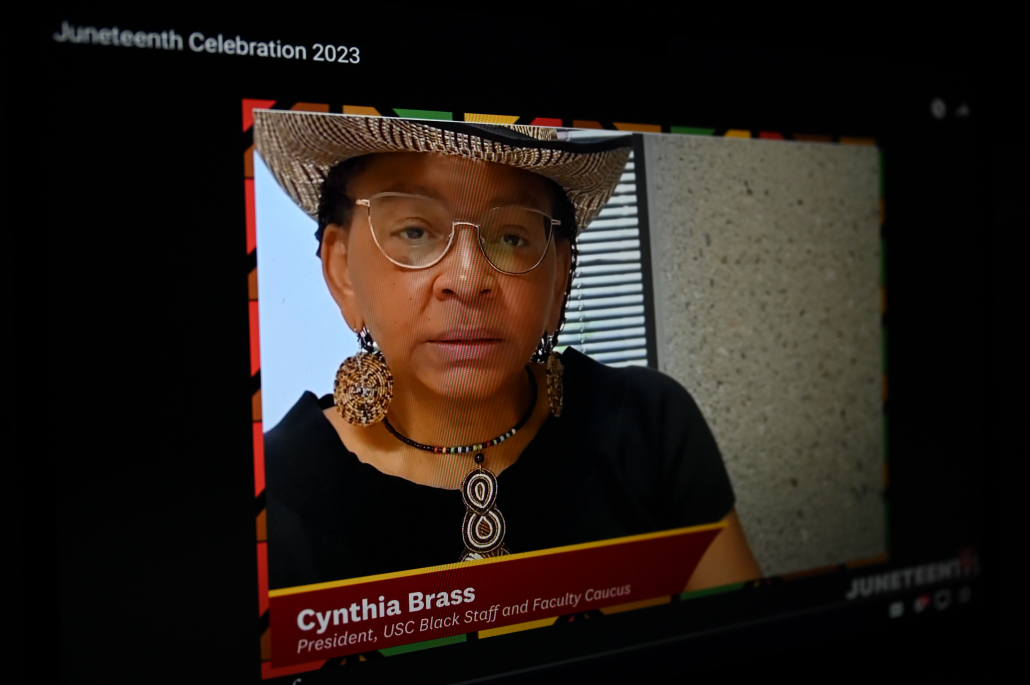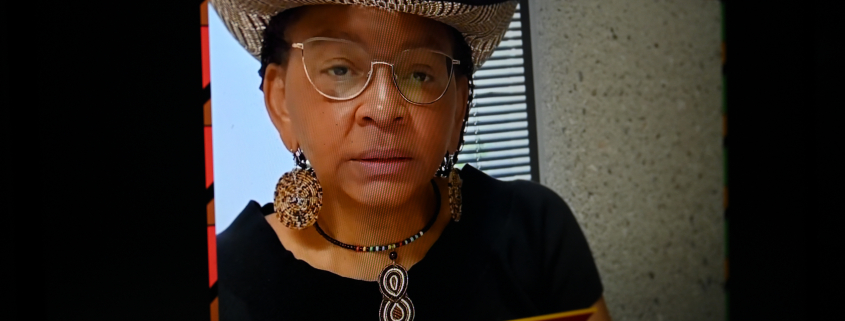USC celebrates Juneteenth with ceremony

“Juneteenth is more than a holiday,” said Cynthia Brass, coordinator of Trojan Kids Camp and president of the Black Staff and Faculty Caucus at USC. “It’s a history day.”
USC celebrated Juneteenth with a ceremony featuring speeches and performances by University faculty and organizations Monday.
Juneteenth celebrates the anniversary of when United States soldiers marched into Galveston, Texas and ordered that the last enslaved people be freed. This final liberation took place June 19, 1865, two and a half years after the Emancipation Proclamation was signed Jan. 1, 1863. While the holiday has been long celebrated by Black communities in the U.S., it became a federal holiday in 2021.
The ceremony featured speeches by President Carol Folt; Jody Armour, the Roy P. Crocker professor of law at the Gould School of Law; Shannon Bradley, Keck School of Medicine’s chief diversity and inclusion officer; and others. Also shown were performances by Courtnee King, a graduate student at the Price School of Public Policy, and James Pickens Jr. of “Grey’s Anatomy.” The speeches and performances were all pre-recorded, and the 33-minute ceremony was held via webinar.
USC’s celebration began with a rendition of “Lift Every Voice and Sing,” also known as “The Black National Anthem,” performed by King. The song is a hymn originally written by James Weldon Johnson, a leader of the NAACP, and composed by his brother, John Rosamond Johnson, in 1900.
After the Black National Anthem, President Folt gave a brief speech thanking participants and viewers for joining the celebration. She spoke on the long history of Juneteenth in Los Angeles, referencing celebrations dating back to the 1890s. During the Great Migration, Folt said, many moved to L.A. from Texas to escape Jim Crow-era racial violence and seek prosperity.
“Today, as a Trojan family,” she said, “we come together in that same spirit, just as many Trojans have been doing for decades in their homes, churches and communities.”
Folt also mentioned the contributions of USC alumni and faculty to L.A.’s Black history. Some notable members include John and Vada Somerville, who founded the first L.A. chapter of the NAACP, Allissa Richardson, who founded the first Artificial Intelligence-powered Black media archive at the Charlotta Bass Journalism and Justice Lab at Annenberg, and Allyson Felix, the most decorated female track and field athlete in Olympic history. Felix recently visited USC when the University renamed the former Dean Cromwell Field in her honor.
John Brooks Slaughter, professor emeritus of education and computer engineering at the Rossier School of Education and the first Black director of the National Science Foundation, gave a speech in which he lamented the lack of public knowledge of Juneteenth and how it took recent publicized brutalities against Black people to bring the holiday to the national stage.
“It is a sad commentary that it took the tragedies of George Floyd, Breonna Taylor, Daunte Wright and countless other Black Americans, [for] the leaders of the citizens of this nation to know the meaning and significance of Juneteenth.”
John Brooks Slaughter, professor emeritus of education and computer engineering at the Rossier School of Education and the first Black director of the National Science Foundation
“It is a sad commentary,” Slaughter said, “that it took the tragedies of George Floyd, Breonna Taylor, Daunte Wright and countless other Black Americans, [for] the leaders of the citizens of this nation to know the meaning and significance of Juneteenth.”
Slaughter recalled his family’s history of slavery and Juneteenth. He shared that his grandparents were born into slavery, and that festive community picnics took place every June in Kansas City, Missouri.
At the end of his speech, Slaughter reminded the audience of current threats to the teaching of Black history in the U.S.
“Those in power … are attempting to nullify the history of more than 400 years of struggle that Black Americans have endured to become acknowledged as full and constitutionally recognized citizens of the United States,” he said. “But they will fail because, as Martin Luther King Jr. reminded us, ‘Truth crushed to Earth will rise again.’’’
The attempts to erase Black history from school curriculums were the focus of a speech given by Christopher Manning, USC’s chief inclusion and diversity officer. Manning emphasized the importance of learning Black history and its essential link to U.S. history.
“The story of African American people is the story of the American people,” Manning said. “Without it, the economy of the English colonies makes no sense. The language Thomas Jefferson used in the Declaration of Independence makes no sense. The deaths of hundreds of thousands of soldiers in the Civil War makes no sense. The history of American food, music and culture makes no sense. And, most importantly, the country’s gradual movement towards greater inclusivity makes no sense.”
Other speakers at the event included women’s soccer student-athlete Simone Jackson; Tonisha Jester, senior associate director of the Marshall School of Business’ Office of Diversity, Equity, and Inclusion; and Damarea Parker, supervisor of the Center for Black Cultural and Student Affairs.
Pickens read a short story by author and playwright Sharon Blount, who graduated from Annenberg in 2016. Blount wrote “The Signing,” published in “08:46 – Fresh Perspectives,” a compilation of stories by 44 Black playwrights compiled by New World Theatre after the murder of George Floyd.
“The Signing” is written from the perspective of a Black man sent to aid Thomas Jefferson in Virginia to sign the Declaration of Independence. The story centers around the phrase “all men are created equal” and the narrator’s initial hope that Black people in the soon-to-form U.S. would be equal, too. Throughout the story, the narrator’s hopes are shattered as he realizes “all men” refers to white men only.
“You see me, yet you don’t,” the story reads. “I’m aware of my right to belong, to exist in this land. I am created equal, yet you fail to see me. I am entitled to every word you sign. You cannot sign me out. You just sign me in.”

